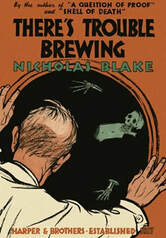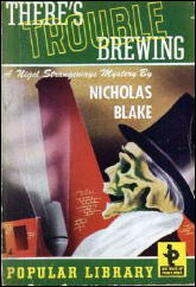
One aspect I find especially admirable is how thoroughly Blake – the pseudonym for writer and future Poet Laureate of the United Kingdom Cecil Day-Lewis – commits to the fair-play mystery format, a path he traveled to augment his income while he crafted poetry. While these GAD books are filled with good humor and a fair dose of literary asides and allusions, the author never shorts the elements expected for a rousing fair-play puzzle. There are alibis to be shaken and confirmed or broken, odd clues (bits of a signet ring, a missing report) to be pondered, and a healthy variety of suspects, many whose prospects would improve with the victim handily out of the way. The reader is given access to the thoughts and tabulations of Blake's amateur detective protagonist Nigel Strangeways, and we see what Nigel sees... until the pieces rearrange to form a clear picture for him, and then we might have to wait a bit longer before Strangeways provides a final-chapter dénouement explaining it all.
In other words, Blake's 1930s titles deliver exactly what a classic mystery fan has come to comfortably expect from the genre. There is also the benefit that Blake/Day-Lewis writes very enjoyable, sometimes wry prose, and he does not shy away from extending a metaphor or making literary references. (Thou Shell of Death, especially with its title, turns partly on Strangeways' knowledge of Jacobean Revenge stage drama.) These (for me) are always amusing rather than obstructive, as when Nigel muses that being a Classics scholar was fine preparation for his current role as an investigator of murder:
"If ever, in your salad days – as one of my comic uncles calls them – you were compelled to do a Latin unseen, you'll know that it presents an accurate parallel with criminal detection. You have a long sentence, full of inversions; just a jumble of words it looks at first. That is what a crime looks like at first sight, too. The subject is a murdered man; the verb is the modus operandi, the way the crime was committed; the object is the motive. Those are the three essentials of every sentence and every crime. First you find the subject, then you look for the verb, and the two of them lead you to the object. But you have not discovered the criminal – the meaning of the whole sentence yet. There are a number of subordinate clauses, which may be clues or red-herrings, and you've got to separate them from each other in your own mind and to reconstruct them to fit and to amplify the meaning of the whole. It's an exercise in analysis and synthesis – the very best training for detectives."
The inspector believes it's a straightforward case: Joe killed Eustace and escaped on his boat. It's possible, but Nigel wonders why the murderer subjected the victim to boiling when it wasn't necessary. He also worries about town resident and old school friend Herbert Cammison, who, with his wife, seems to be concealing a secret about Bunnett that might lead the police to their door.

 RSS Feed
RSS Feed